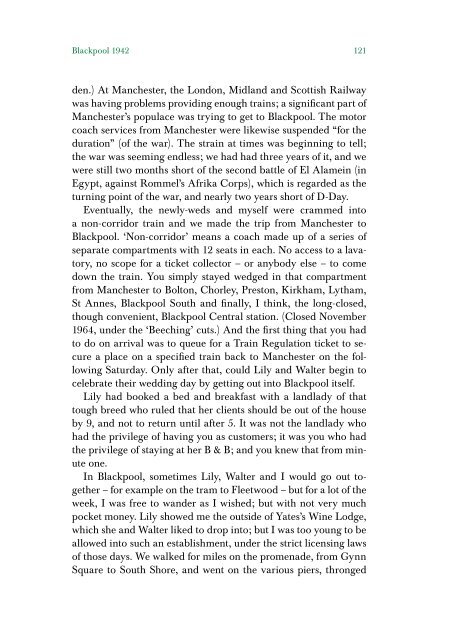Roger Atkinson - Blackout, Austerity and Pride
Blackout, Austerity and Pride – Life in the 1940s is a book written primarily from actual experience. It tells how an alert and intelligent boy, effectively orphaned at the age of 13, sets out to gain a foothold in life. Aided by some resourceful women, he unites a thirst for knowledge with a growing passion for places and buses and a strong sense of duty. http://www.memoir1940s.org.uk/
Blackout, Austerity and Pride – Life in the 1940s is a book written primarily from actual experience. It tells how an alert and intelligent boy, effectively orphaned at the age of 13, sets out to gain a foothold in life. Aided by some resourceful women, he unites a thirst for knowledge with a growing passion for places and buses and a strong sense of duty.
http://www.memoir1940s.org.uk/
You also want an ePaper? Increase the reach of your titles
YUMPU automatically turns print PDFs into web optimized ePapers that Google loves.
Blackpool 1942<br />
121<br />
den.) At Manchester, the London, Midl<strong>and</strong> <strong>and</strong> Scottish Railway<br />
was having problems providing enough trains; a significant part of<br />
Manchester’s populace was trying to get to Blackpool. The motor<br />
coach services from Manchester were likewise suspended “for the<br />
duration” (of the war). The strain at times was beginning to tell;<br />
the war was seeming endless; we had had three years of it, <strong>and</strong> we<br />
were still two months short of the second battle of El Alamein (in<br />
Egypt, against Rommel’s Afrika Corps), which is regarded as the<br />
turning point of the war, <strong>and</strong> nearly two years short of D-Day.<br />
Eventually, the newly-weds <strong>and</strong> myself were crammed into<br />
a non-corridor train <strong>and</strong> we made the trip from Manchester to<br />
Blackpool. ‘Non-corridor’ means a coach made up of a series of<br />
separate compartments with 12 seats in each. No access to a lavatory,<br />
no scope for a ticket collector – or anybody else – to come<br />
down the train. You simply stayed wedged in that compartment<br />
from Manchester to Bolton, Chorley, Preston, Kirkham, Lytham,<br />
St Annes, Blackpool South <strong>and</strong> finally, I think, the long-closed,<br />
though convenient, Blackpool Central station. (Closed November<br />
1964, under the ‘Beeching’ cuts.) And the first thing that you had<br />
to do on arrival was to queue for a Train Regulation ticket to secure<br />
a place on a specified train back to Manchester on the following<br />
Saturday. Only after that, could Lily <strong>and</strong> Walter begin to<br />
celebrate their wedding day by getting out into Blackpool itself.<br />
Lily had booked a bed <strong>and</strong> breakfast with a l<strong>and</strong>lady of that<br />
tough breed who ruled that her clients should be out of the house<br />
by 9, <strong>and</strong> not to return until after 5. It was not the l<strong>and</strong>lady who<br />
had the privilege of having you as customers; it was you who had<br />
the privilege of staying at her B & B; <strong>and</strong> you knew that from minute<br />
one.<br />
In Blackpool, sometimes Lily, Walter <strong>and</strong> I would go out together<br />
– for example on the tram to Fleetwood – but for a lot of the<br />
week, I was free to w<strong>and</strong>er as I wished; but with not very much<br />
pocket money. Lily showed me the outside of Yates’s Wine Lodge,<br />
which she <strong>and</strong> Walter liked to drop into; but I was too young to be<br />
allowed into such an establishment, under the strict licensing laws<br />
of those days. We walked for miles on the promenade, from Gynn<br />
Square to South Shore, <strong>and</strong> went on the various piers, thronged


















